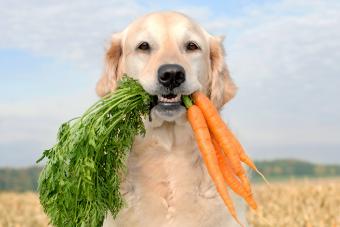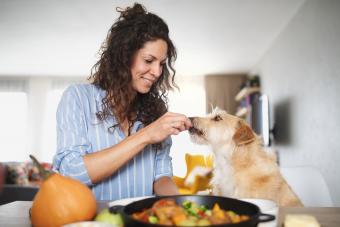
Yes, dogs can eat carrots. As with any other food, there are precautions and recommendations for feeding, but as long as guidelines are followed, carrots can be a beneficial addition to your dog's diet.

Carrots Improve Your Dog's Health
Not only are carrots an affordable occasional snack for your dog, they contain nutrients that are vital for your dog's overall health. Carrots provide vitamins A, B, C, D, E, and K, as well as potassium, beta-carotene, calcium, niacin, phosphorus, and magnesium. Here's a list of the most critical vitamins and their health benefits:
Beta-Carotene
Beta-carotene, the orange pigment that gives carrots their distinctive color, is the first form of vitamin A that is required for good eyesight, particularly at night. It also functions as an antioxidant, aiding in the prevention of sickness and infection, normal bone formation, reproductive health, and reduced cancer risk.

Vitamin A
Carrots are high in Vitamin A, which promotes eye health, strengthens the immune system, and improves the skin and coat. Vitamin A toxicity is a possibility, albeit it is uncommon. As with any treat, keep proportions in mind and enjoy in moderation. Carrots can be a terrific addition to your dog's diet, but they should not be used as a substitute for their regular diet.
Fiber and Water
A raw carrot contains up to 95% water, which, when paired with the dietary fiber content, helps your dog's digestion stay healthy and regular. Dietary fiber aids in the maintenance of a healthy intestinal system and is necessary for appropriate stool consistency.
Oral Health
Carrots are also beneficial to oral health. By scraping away tartar and avoiding plaque accumulation that contributes to periodontal disease, chewing on a crunchy carrot can help your dog's oral health. Carrots are low in both calories and fat, making them a great and nutritious weight-loss treat for dogs.
What to Avoid
Just as with any other food, carrots should be fed in moderation. They are high in natural sugar, like other vegetables and fruits. Obesity and dental damage can both be caused by too much sugar. Carrots also have a high fiber content. When you add a lot of fiber to your dog's diet all at once, it can cause gas and stomach trouble.
To avoid digestive blockages, introduce carrots slowly and provide plenty of drinking water. If you feel your dog has eaten too many carrots and detect signs of digestive distress, such as vomiting or diarrhea, call your veterinarian.
How Many Carrots Can Dogs Have?
In general, small dogs under 10 pounds can have one or two baby carrots in one day. Medium and large dogs can consume 1 large carrot or 2-3 baby carrots. Remember, variety is critical with nutrition to avoid overconsumption of the same vitamins and minerals. Providing carrots once or twice per week is acceptable. If your dog has an illness, or history of illness, contact your veterinarian to ask if carrots are acceptable as well as the amount that's recommended.
How to Prepare Carrots for Optimal Nutrition
Carrots should be carefully cleaned to eliminate all dirt and pesticides, just like any other fruits and vegetables. Unless you're giving your dog organic carrots, you should peel the carrots to remove any pesticide residue.
Carrots, both raw and cooked, are good for dogs and offer a nutritional addition to their meals. While carrots are generally safe to offer to your dog, it is necessary to cut whole carrots and even carrot sticks into bite-size portions before doing so. This will reduce the risk of choking, especially for small dogs.
If you're interested in a completely natural approach, you can leave the leafy greens on the top of the carrot for your dog to consume. Some dogs actually prefer you leave them on, as they add extra flavor to their delicious treat.

You can try steaming or boiling carrots to break down some of the fiber and aid in digestion. Raw carrots have a cellulose wall that dogs cannot digest, so cooking them may be preferable to reaping the full nutritional benefits for your dog. Puree boiling carrots and stir them into your dog's diet for a boost of fiber and important nutrients in young pups and older dogs.
Carrot juice is also an option if your dog enjoys slurping up flavored liquids. Although carrot juice is high in vitamin A, the dietary fiber is lost during the juicing process. You can add part of the pulp back into the juice to ensure that your pet gets all the fiber they need. If your dog doesn't drink the carrot juice right away, you can keep it in the fridge for up to one day.
Carrots Are a Safe Occasional Treat
Carrots, raw or cooked, can be a delightful snack, a tasty supplement to regular dog food, or a training reward. Offer them to your dog in moderation, as too much fiber and sugar might have negative side effects. They can be a choking hazard for dogs, especially tiny dogs and pups, so only give them thin slices. If you have any concerns, contact your veterinarian or a holistic veterinarian to learn more about how to feed your dog carrots.







